-
Choosing a Site for Your Rental Dumpster
If you’re seeking a commercial dumpster rental for any reason, one of the most important decisions you’ll need to make in addition to the size of the rental dumpster itself is where the dumpster will be placed on your worksite or commercial property. Your dumpster rental provider in Atlanta can help you select the right front load or roll-off rental dumpster for your needs, and here are a few tips for helping you select the best drop-off site for the dumpster you select.
- Choose a site that is close to waste-generating activities to make it easier on workers to get waste inside the dumpster
- Choose a site that does not block foot or car traffic
- Choose a site that can easily be access by the truck delivering and picking up the rental dumpster
- Choose a site far enough away from valuable or sensitive equipment that might be damaged if any waste falls out of the dumpster or is accidently thrown over
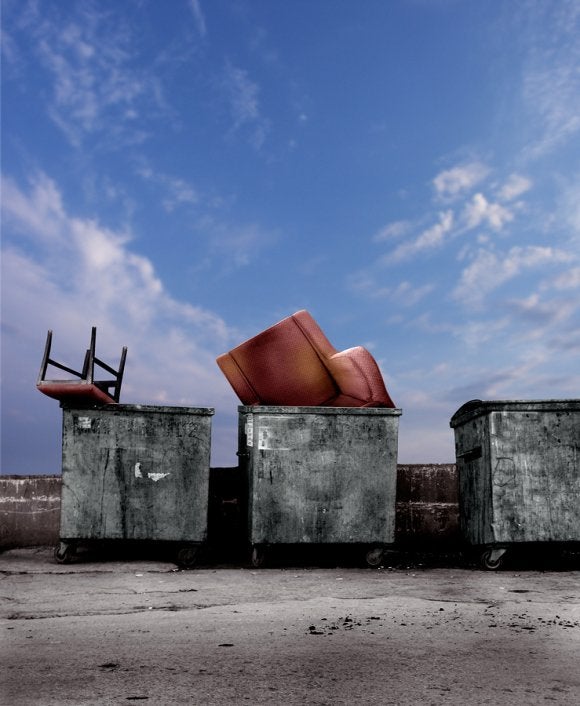
-
A Look at Trends in Green Technologies
Today’s technological innovations are designed to conserve energy and natural resources. With green technology, you can help your business generate less waste, while also saving on the costs of energy and other resources. Some of the most amazing green technologies that have been released in current years include LED lightbulbs and personal solar charging devices. If you would like to boost the environmental impact of your business, you may want to consider asking your local recycling center about how you can better use your recycling bins. When you recycle, you will be doing your part to protect the environment. A company specializing in recycling bins in Atlanta can help you create a recycling program for your business. To tour some of the top trends in green technologies, check out this video from TheRichest.
-
Exploring the Components of an Effective Waste Management Plan
As the owner of a commercial business or industrial factory, waste management is probably near the top of your list of concerns. With proper waste management , you can conserve important materials, while also ensuring that your waste is properly eliminated. A company that specializes in recycling and waste near Atlanta can help you get started on a waste management plan for your commercial business. A team of waste management professionals can answer your questions about the dos and don’ts of proper waste management. Read on for a closer exploration of an effective waste management plan.
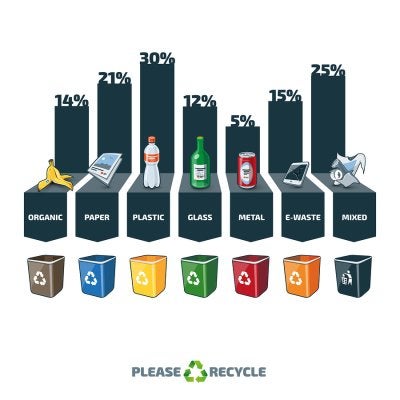
Sustainable Materials Management
When you are creating an effective waste management plan for your business, you will want to consider how you are managing your sustainable materials. During the production process, many materials may be used and discarded that can be seen as sustainable resources for your business. By structuring the way that you reduce and reuse, you can go a long ways towards improving your waste management.
An Effective Plan or Strategy
Effective waste management requires ongoing planning and strategizing on behalf of every member of your staff. When you are revamping your waste management plan, it is a great idea to take the time to outline your waste management objectives or goals. With a clearly outlines plan, you can ensure that your waste management goals are being met. Additionally, you may want to create planning cycles that will allow you to evaluate your waste management strategies at key intervals.
Collaboration and Worker Participation
Finally, an effective waste management strategy will include the willing participation of every member of your team of staff. By getting everyone on board for your waste management plan, you can rest assured that your waste strategies are being implemented on a daily basis. By encouraging all of your employees to get involved, you will be able to launch a waste management program that is a total success for your business.
-
Guidelines for Operating an Industrial Waste Management System
There are very specific guidelines that govern anyone involved with industrial waste production or waste disposal in Atlanta . Industrial processes typically produce solid waste, hazardous waste, and mixed waste. Here are the waste disposal methods that industrial manufacturers must adhere to in order to operate a lawful, efficient, and comprehensive waste management system.
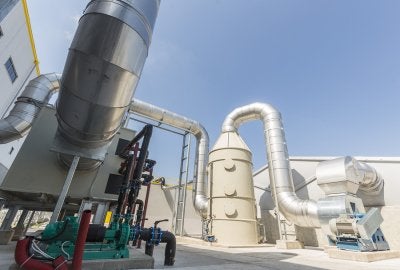
Solid Waste Disposal
Solid waste is non-hazardous, non-household waste that is generated during industrial manufacturing processes. Industrial solid waste management requires that the waste be evaluated, either by laboratory testing or documenting its characteristic, to determine whether or not it is hazardous. Common forms of industrial solid waste include empty containers, building materials, paint residue, sludge, tires, food waste, animal remains, and glass and plastic that can’t be recycled. Your local waste management company can perform waste disposal for all non-hazardous materials and waste.
Hazardous Waste Disposal and Recycling
Hazardous waste is any waste that is harmful to human health or the environment. This waste may be in liquid, solid, gas, or sludge form, and may include discarded industrial products or by-products. Hazardous industrial waste must often be stabilized and/or solidified prior to waste disposal. Hazardous waste disposal methods may include incineration, destruction, recycling, and isolation in landfills. Hazardous waste recycling involves reusing or reclaiming hazardous industrial waste. Waste is reclaimed when it is processed to recover a reusable product, or if it is regenerated. Some hazardous waste, like lead-acid batteries or electronic circuit boars, can be recycled into new products
Mixed Waste Disposal
Mixed waste consists of both radioactive and hazardous materials or components. The Resource Conservation and Recovery Act and the Atomic Energy Act regulate mixed waste disposal, and the U.S. Nuclear Regulatory Commission and the U.S. Department of Energy regulate radioactive waste disposal. Most industrial mixed waste is categorized as low-level mixed waste. Mixed waste management and waste disposal is significantly more expensive than radioactive waste; however, a waste generator can reduce the volume of mixed waste that is produced by industrial processes.
-
The Different Types of Construction Waste
If you own or operate a business that produces construction waste, a waste management or recycling company can help you reduce and eliminate this waste. A waste management company can provide roll off dumpsters in different sizes for use in construction, demolition, restoration, or remodeling projects. Here is a look at some of the different types of construction waste that can be reused or recycled by a waste management company in Atlanta .
Building Materials
Construction, demolition, restoration, and remodeling projects all produce a lot of building material waste. This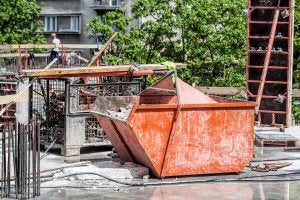 waste may include insulation, nails, electrical wiring, rebar, wood, plaster, scrap metal, cement, and bricks. These materials may be damaged or unused, but can be recycled or reused in other forms. Waste wood can be recovered and recycled into wood for new building projects. Cement, bricks, and plaster can be crushed and reused in other construction or building projects. These materials can be collected in a roll of dumpster that can then be picked up by your waste management or recycling company.
waste may include insulation, nails, electrical wiring, rebar, wood, plaster, scrap metal, cement, and bricks. These materials may be damaged or unused, but can be recycled or reused in other forms. Waste wood can be recovered and recycled into wood for new building projects. Cement, bricks, and plaster can be crushed and reused in other construction or building projects. These materials can be collected in a roll of dumpster that can then be picked up by your waste management or recycling company. Dredging Materials
Dredging materials are materials or objects that are displaced during the preparation of a construction or demolition site. These materials may include trees, tree stumps, rubble, dirt, and rocks. A waste management company can provide waste disposal and trash removal of dredging materials. If any of these materials can be reused or recycled, they will be taken to a recycling plant. A waste management company can also provide dumpster rentals in which you can collect this waste.Hazardous Waste
The sites of construction, demolition, restoration, and remodeling projects often produce hazardous waste. Hazardous waste may include lead, asbestos, plasterboard, paint thinners, strippers, and solvents, mercury, fluorescent bulbs, and aerosol cans. These materials need to be disposed of according to strict state and federal laws, and there are harsh fines and punishments for non-compliance. A waste management company in Atlanta can help you comply with city, county, and state guidelines, as well as with your insurance requirements for the safe disposal of hazardous waste. -
Characterizing the Different Types of Industrial Waste
Industrial waste management in Atlanta is a crucial service for any business whose processes include manufacturing or production. Industrial activities produce a significant amount of waste, and without a comprehensive waste disposal program, the health and safety of your employees may be at risk. With so many different categories of industrial waste, it’s important to understand what materials can be reused and recycled, and how to properly manage and reduce waste disposal. Here are some facts about the different categories of industrial waste.
Chemical Waste
Chemical waste is typically generated by factories, processing centers, warehouses, and plants. This waste may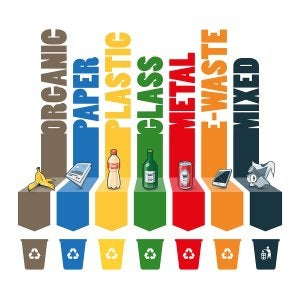 include harmful or dangerous chemicals and chemical residue, and waste disposal must adhere to careful guidelines. These guidelines are instituted and regulated by various government and environmental agencies, such as the Environmental Protection Agency, and the Occupational Safety and Health Administration. There are generally fines associated with non-compliance. Chemical waste must be segregated on-site, and waste disposal may need to be handled by a specialist to ensure compliance with health, safety, and legal requirements.
include harmful or dangerous chemicals and chemical residue, and waste disposal must adhere to careful guidelines. These guidelines are instituted and regulated by various government and environmental agencies, such as the Environmental Protection Agency, and the Occupational Safety and Health Administration. There are generally fines associated with non-compliance. Chemical waste must be segregated on-site, and waste disposal may need to be handled by a specialist to ensure compliance with health, safety, and legal requirements. Solid Waste
In industrial services, solid waste includes a variety of different materials, including paper, cardboard, plastics, packaging materials, wood, and scrap metal. Some of these materials can be reused and recycled by a recycling center. If you don’t have a comprehensive waste management plan that includes recycling, your waste disposal is not going to be as cost-effective or environmentally friendly as it could be. A recycling center can process the majority of industrial solid waste, effectively reducing your waste disposal costs.Toxic and Hazardous Waste
Toxic and hazardous waste is comprised of materials that can cause serious health and safety problems if waste disposal is not handled correctly. This type of waste typically includes dangerous byproducts materials generated by factories, farms, construction sites, laboratories, garages, hospitals, and certain production and manufacturing plants. The EPA and state departments regulate toxic and hazardous waste disposal. This waste disposal is only legal at special designated facilities around the country.
RECENT POSTS
categories
- Uncategorized
- Waste Management Atlanta
- Waste Disposal and Recycling
- Hazardous Waste Disposal
- Chemical waste removal
- solid waste removal
- R3 Program
- Sustainable Organizations
- Sustainable Waste Removal
- Commercial Waste Removal
- Materials Management Program
- Dumpster Rental
- Roll Off Dumpsters
- Construction Site Waste Removal
- Sustainability
- Recycling in Atlanta
- Industrial Recycling
- Industrial Waste Removal Services
- Southern Waste & Recycling
- Waste Removal Atlanta
- Waste Specialists
- Atlanta
- Infographic
- Front Load Dumpsters
- Rear Load Dumpsters
- Reusable Electronics
- Dump Truck Atlanta
- Recyclable Electronics
- Trash Compactors
- Recycling
- Recycling Program
- Office Recycling
- Metal Recycle
- Electronic Waste
